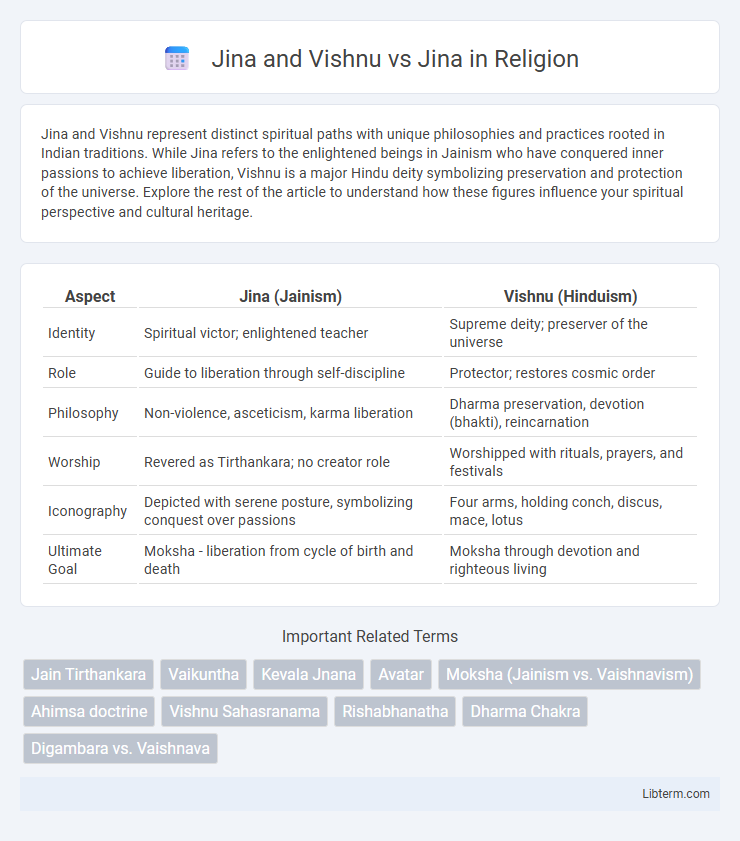Jina and Vishnu represent distinct spiritual paths with unique philosophies and practices rooted in Indian traditions. While Jina refers to the enlightened beings in Jainism who have conquered inner passions to achieve liberation, Vishnu is a major Hindu deity symbolizing preservation and protection of the universe. Explore the rest of the article to understand how these figures influence your spiritual perspective and cultural heritage.
Table of Comparison
| Aspect | Jina (Jainism) | Vishnu (Hinduism) |
|---|---|---|
| Identity | Spiritual victor; enlightened teacher | Supreme deity; preserver of the universe |
| Role | Guide to liberation through self-discipline | Protector; restores cosmic order |
| Philosophy | Non-violence, asceticism, karma liberation | Dharma preservation, devotion (bhakti), reincarnation |
| Worship | Revered as Tirthankara; no creator role | Worshipped with rituals, prayers, and festivals |
| Iconography | Depicted with serene posture, symbolizing conquest over passions | Four arms, holding conch, discus, mace, lotus |
| Ultimate Goal | Moksha - liberation from cycle of birth and death | Moksha through devotion and righteous living |
Understanding Jina: Core Beliefs and Principles
Jina, a term rooted in Jainism, represents a spiritual conqueror who has achieved liberation through strict adherence to non-violence, truth, and asceticism, embodying core Jain principles of self-discipline and karma control. Vishnu, a principal deity in Hinduism, symbolizes preservation and cosmic order, focusing on dharma and divine protection rather than liberation through self-mastery. Understanding Jina emphasizes inner conquest and ethical rigor, contrasting with Vishnu's role in sustaining the universe and upholding righteousness within the Hindu framework.
Who is Vishnu? Role in Hinduism
Vishnu is one of the principal deities in Hinduism, revered as the preserver and protector of the universe, often depicted with blue skin and four arms holding a conch, discus, lotus, and mace. He embodies dharma (cosmic order) and is part of the Hindu trinity (Trimurti) alongside Brahma and Shiva, responsible for creation, preservation, and destruction respectively. In contrast, Jina refers to a spiritual conqueror in Jainism, embodying liberation and enlightenment, whereas Vishnu plays a central role in maintaining worldly balance and guiding devotees through avatars like Krishna and Rama.
Comparing Jina and Vishnu: Key Differences
Jina, in Jainism, refers to a spiritual conqueror who has attained liberation by overcoming inner passions and ignorance, symbolizing ultimate non-attachment and self-discipline. Vishnu, a principal deity in Hinduism, is revered as the preserver and protector of the universe, embodying divine intervention and cosmic order through his avatars. The key difference lies in Jina's focus on personal spiritual conquest and liberation, contrasted with Vishnu's role as a universal preserver actively involved in worldly affairs.
The Concept of Divinity: Jina vs Vishnu
Jina represents the conqueror of inner passions and symbolizes spiritual liberation through self-discipline and non-violence in Jainism, embodying the ideal of a perfected soul who has achieved moksha. Vishnu, in Hinduism, embodies the preserver and protector of the universe, often depicted as a divine deity who intervenes in worldly affairs through avatars to restore cosmic order. The concept of divinity in Jina focuses on individual spiritual conquest and enlightenment, whereas Vishnu represents an active, personal god maintaining dharma and cosmic balance.
Liberation and Salvation: Jainism vs Vaishnavism
Jina in Jainism signifies the conqueror who attains liberation (moksha) by eradicating karma through self-discipline, non-violence, and individual effort, emphasizing personal spiritual emancipation without divine intervention. Vishnu in Vaishnavism is revered as the Supreme God whose grace grants salvation (moksha), highlighting devotion (bhakti) and surrender as the paths to liberation. Jainism's liberation centers on self-realization and asceticism, whereas Vaishnavism stresses divine grace and devotional worship as essential for attaining eternal bliss.
Ethical Practices: Jain and Vaishnav Traditions
Jain ethical practices emphasize non-violence (ahimsa), truthfulness (satya), and strict asceticism, fostering spiritual liberation through self-discipline and renunciation. Vaishnav traditions prioritize devotion (bhakti) to Vishnu, adherence to dharma, and compassion, guiding followers toward righteousness and divine grace. Both paths uphold high moral standards but differ in approach: Jainism centers on self-purification, while Vaishnavism emphasizes loving surrender to God.
Rituals and Worship: Jina versus Vishnu Approaches
Jina worship in Jainism emphasizes personal purification through rituals such as meditation, recitation of scriptures, and offerings symbolizing detachment from worldly desires, focusing on self-discipline and liberation (moksha). Vishnu worship in Hinduism involves elaborate rituals, including temple ceremonies, yajnas (fire sacrifices), and bhakti (devotional practices) aimed at invoking divine grace for protection and prosperity. Jina rituals center on inner spiritual progress without deity intervention, whereas Vishnu rituals engage with a personal god facilitating worldly and spiritual benefits.
Historical Interactions: Jainism and Vaishnavism
Jainism, centered on the teachings of Jinas or Tirthankaras, emphasizes non-violence and asceticism, while Vaishnavism venerates Vishnu as the Supreme God manifesting in various avatars. Historically, Jain and Vaishnav communities coexisted in India, with mutual respect alongside occasional theological debates reflected in ancient texts and temple art. These interactions shaped regional religious practices, fostering a syncretic culture where pilgrimage sites and festivals sometimes overlapped, highlighting the deep-rooted coexistence of Jina and Vishnu traditions.
Philosophical Debates: Jina vs Vishnu Concepts
The philosophical debates between Jina and Vishnu concepts center on the distinct views of liberation and divinity in Jainism and Vaishnavism. Jina emphasizes self-realization through strict ethical discipline, non-violence, and the soul's liberation from karma, while Vishnu represents a supreme deity whose grace grants salvation and sustains cosmic order. These contrasting metaphysical frameworks highlight the divergence between self-effort and divine intervention in achieving spiritual liberation.
Modern Perspectives on Jina and Vishnu
Modern perspectives on Jina spotlight the Jain Tirthankaras as spiritual victors who exemplify liberation through self-discipline and nonviolence, contrasting with Vishnu's role in Hinduism as a preserver deity incarnating to restore cosmic order. Scholars emphasize Jina as a symbol of individual soul emancipation beyond ritualistic worship, while Vishnu is often analyzed within the context of divine intervention in worldly affairs. Contemporary interpretations highlight Jina's embodiment of inner conquest and ethical purity, differentiating this from Vishnu's external divine agency in maintaining dharma.
Jina and Vishnu Infographic

 libterm.com
libterm.com